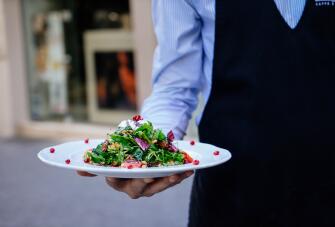Bakery expenses list -2 types of costs explained
Did you know that the artisan bakery market was valued at USD 33.79 billion in 2023 and is expected to reach USD 47.96 billion by 2030? Europe (including us in the UK) is set to lead the charge in the same forecast period.
Running a bakery means managing a unique mix of expenses. Keeping a close eye on them is essential if you want to keep things profitable. From bakery' startup costs like equipment and permits to everyday expenses like ingredients and staffing, understanding and controlling these costs is key to running a successful bakery.
In this complete guide, we’ll break down the main expenses every bakery owner faces and share some practical tips to help you manage costs, boost those profit margins, and keep your bakery's financial health in shape.
Initial costs to start in the bakery industry
When starting your own bakery, having a business plan is a must, and part of that plan should be a detailed breakdown of your expected startup costs. So we're going to cover essential startup expenses you’ll need to consider, no matter what type of bakery business model you use:
-
Kitchen equipment and supplies: Bakery equipment like ovens, refrigerators, freezers, and display cases can be pricey. Prices vary depending on quality and brand, so it’s really important to research and allocate funds for these items early on. Oh, by the way, if you want a more detailed overview of what you’ll need, check out our bakery equipment list guide.
-
Renovations and interior design: Whether you're taking over an existing space or building from scratch, renovations may be necessary. Costs here can include things like countertops, flooring, lighting, signage, and even seating arrangements if you're offering a café-style experience.
-
Licences and permits: To sell legally, your bakery space will need several licences and permits (as well as other operating costs), such as health department permits, food service licences, and fire safety inspections. These can add up quickly, so be sure to factor them into your budget.
-
Inventory and ingredients: You'll need to account for your initial inventory and the ongoing cost of ingredients. This includes essential items like flour, sugar, butter, yeast, and any other ingredients you'll need based on your menu.
6 ongoing costs when running your own bakery business
Once you’ve tackled your initial startup costs, it’s time to focus on managing your ongoing expenses to boost your profitability. Here are six key ongoing costs to keep an eye on:
Rent and utilities
Rent and utilities are some of the most predictable ongoing fixed costs you’ll face as a bakery owner. The price of renting a space can vary significantly depending on your location. If you’re opening your bakery in a busy city centre or high-traffic area, expect to pay more. If you’re in a quieter neighbourhood, monthly rent and utilities might be lower. It’s important to negotiate a solid lease that suits your budget, ideally locking in a fixed rate to avoid those unexpected hikes.
Utility costs (like electricity, water, and gas) are also super important since your essential baking equipment runs pretty much all day long. Ovens, mixers, refrigerators, and freezers eat up energy, too, so your bills can be high. To keep costs down, look for energy-efficient equipment where possible, and consider things like switching to LED lights or using timers for your ovens and lights. Don't forget to check whether utilities are included in your lease or if they’re a separate cost.
Your bakers' salaries and wages
Labour costs (or labor costs if you're in the US) are a big part of running your bakery, as you'll need a team to help you bake and serve customers. This can include bakers, pastry chefs, assistants, cashiers, and more. In the UK, a skilled baker earns around £26,000 a year on average, with head bakers earning around £32,500.
Now, this is all about balance. You're going to need enough staff to get the job done, but you don’t want to overstaff, especially during slower hours. Cross-training employees (like having bakers pitch in on cash register duty during quiet times) can help you keep labour costs down without cutting corners on service.
However, recruitment, supply chains, and innovation are front of mind for the baking industry in 2024, as leaders from suppliers, manufacturers, and trade bodies explain in British Baker. Jason Geary, master baker at Geary’s Bakeries, said: "As with many industries, the increasing employment costs in bakery makes maintaining cost prices and affordability ever more difficult. In addition to higher labour costs, it’s also becoming difficult to attract people into baking as a profession, so talent is often at a premium."
Geary goes on to say: "By investing in efficiencies in the right places through the process, we’ve managed to keep our products affordable, without compromising quality or our artisanal integrity."
Cost of goods sold
Cost of goods sold, or COGS, refers to the cost of ingredients you need to make your products, like flour, sugar, butter, and yeast. These costs directly impact your profit margins, so it’s important to keep an eye on them. For example, if you're making a specialty product that requires premium ingredients, like high-end chocolate or organic flour, it’ll cost more, but you’ll need to price it accordingly.
To keep costs down, work with suppliers you trust and make sure you’re getting competitive prices. Buying ingredients for your baked goods in bulk can save you money in the long run, but don’t over-order (especially with perishable items like dairy or fruit.) You also want to regularly assess whether you’re using all the ingredients you buy. If you’re constantly throwing things out due to spoilage, that’s money down the drain.
Inventory management
Thanks to the ongoing supply chain chaos, Sage found that half (52% in the US and 46% in the UK) of retail brands have had stockouts, and we all know that leads to lost sales. Now, imagine that happening at your bakery. No flour for your signature sourdough or no icing for those cupcakes everyone loves. Not a good look, right?
To keep things running smoothly, bakery owners like yourself have got to stay on top of your inventory. Track what you’ve got, what’s running low, and what’s flying off the shelves. If your best-selling cookies are always sold out, make sure you’ve got enough stock to keep up with demand. You don’t want to get caught without the basics so try to order in advance.
Marketing
Getting the word out about your bakery is key to bringing in customers, but marketing and advertising can get expensive fast. Whether you're using social media, local ads, or hosting events, it all adds up. Some big businesses do a fantastic job with marketing that can inspire your own marketing efforts. For instance, Blank Street, a popular café chain, teamed up with singer Sabrina Carpenter (who’s got the chart-topping ‘Espresso’ track) to promote their coffee and food.
While you might not have the same budget as large enterprises, there are still plenty of creative and affordable ways to market your bakery. Platforms like Instagram and TikTok are perfect for showing off your bakery's fresh-baked goods, behind-the-scenes processes, and any special promos you're running. And, while you may not have Sabrina Carpenter money, you could collab with local influencers or host community events (like post-run-club meetups) to get your name out there without spending a fortune.
Packaging and other equipment
If you’ve ever spotted a sausage roll wrapped up in a white bag with the iconic Greggs logo , you know packaging can be as much a part of the brand as the product itself. Greggs has nailed the art of packaging: simple, effective, sustainable, and instantly recognizable.
Now, as tempting as it is to splash out on custom packaging to make your bakery stand out, the costs can pile up. Especially if you’re going eco-friendly with recycled materials or using boxes with your brand logo (which we highly recommend, by the way). According to Délifrance, the UK bakery sector is under pressure to move in the right direction when it comes to green initiatives, and customers are taking note. If you’re just starting out, it’s smart to look at more affordable options like plain bags or boxes. No one says you have to be fancy right from the get-go. You can always upgrade as your business grows.
There's also miscellaneous expenses you need to be aware of like:
-
Licenses and permits
-
Packaging and supplies
-
Automation and technology like a POS system
-
Baking supplies
-
Specialty ingredients
The best POS system for bakeries
Sieve through your business data and bake the next batch better with Epos Now’s advanced stock-control system, speedy checkout software, and real-time reports.
3 tactics to control your bakery expenses
To keep your bakery profitable, it’s about more than just having great pastries. Controlling your expenses is just as important, and it takes a bit of strategy. Besides the basics, here are three key tactics to get your bakery on track for financial success.
Build strong relationships with your suppliers
If you’re just placing orders here and there without thinking about the long game, you’re missing out. Building strong relationships with your suppliers means you’re not just another faceless customer. You become a valued partner. That’s how you get those awesome discounts, loyalty perks, and the inside scoop on sales before anyone else.
If you’re regularly ordering the same essential supplies, talk to your suppliers about bulk discounts or special pricing for repeat customers. The more consistent you are, the more likely they’ll be to offer you a better deal. You could even negotiate better payment terms or delivery schedules that suit you better. And, in the worst-case scenario (supply chain hiccups, for instance), a good relationship means your suppliers will work with you to find solutions or prioritise your needs. Supplier relation is key.
Automate different areas of your baking business
Now, we know, the word “automation” can sound like something out of a sci-fi movie, but trust us, it’s your best friend when it comes to cutting bakery expenses. You’ve probably got a lot of stuff that takes up time and energy every single day. A bakery POS system can do a lot of the heavy lifting for you.
Inventory management? Done. With your POS software, you’ll know exactly how many croissants you’ve got left on the shelf before they even start selling out. No more guessing how much butter you need to order this week. Your system will track stock levels in real-time and even alert you when it’s time to restock.
Your POS system can also handle employee scheduling. You can see when business is booming and when it’s a bit quieter, so you’re not overstaffing. This helps keep labour costs down without losing out on customer service during busy periods. Imagine all the time you’ll save by not manually figuring out who’s working when.
No one wants to spend forever ringing up orders, especially when you’ve got a line of people waiting for their cinnamon rolls. With a complete checkout solution integrated into your POS software, payments are faster, orders are processed in seconds, and your cash register updates automatically.
Reduce food waste for better stock control
Waste is like the silent profit killer. It’s sneaky, but once you realise how much it’s costing you, you can make some real positive changes. The good news is that smarter stock control with your bakery POS system means you can eliminate a lot of that waste.
Let’s say you’re baking a batch of muffins, and they’re not flying off the shelves. Without a POS system, you wouldn’t know until the end of the day (or worse, tomorrow) that you’ve got excess stock. But with a bakery POS system, you can track exactly how much of each product is selling at any given time.
Plus, we also think it’s important for all you owners and aspiring bakery owners out there to consider the environmental aspect. According to Waste Managed, the UK wastes approximately 9.5 million tonnes of food every year. That's a lot of perfectly good food getting tossed. By managing stock more effectively, you can for waste reduction and be part of the solution.
Use budgeting tools to track costs effectively
If you're still manually entering numbers into spreadsheets or relying on separate systems for tracking sales and expenses, it’s time for an upgrade. The best point of sale programs seamlessly integrate with popular accounting apps like Quickbooks and Sage Accounting.
You don’t have to waste time double-checking or manually transferring data. When a customer buys that delicious cupcake from you, the transaction is immediately recorded in your POS system. At the same time, the sale is logged in your accounting app, updating your revenue numbers without you lifting a finger. This means your sales data is always up to date and accurately reflects your daily activity.
FAQs about a bakery expenses list
- What are the fixed expenses of a bakery?
-
Fixed expenses in a bakery are costs that stay the same each month, regardless of how much you sell. These typically include things like rent or mortgage payments for your bakery space, insurance, and salaries for your full-time staff (such as head bakers or managers).
- What are the overhead costs in a baking business?
-
Overhead costs refer to the ongoing expenses that are necessary to run your bakery, but aren't directly tied to producing baked goods. These operational costs can include things like marketing and advertising costs, interior design and decorating costs, accounting fees, office supplies, and maintenance of equipment.
- Which costing method is used in a bakery?
-
In a bakery, the most commonly used costing methods are standard costing and job order costing.
- Standard costing involves setting a fixed cost for each item based on expected ingredient costs, labour, and overhead. It helps keep pricing consistent and allows you to track how actual costs compare to the estimated costs. This is great for a bakery with a steady menu, as it ensures you’re not losing money on any of your products.
- Job order costing is used for custom orders or if you’re making special items for events like weddings or corporate parties. With job order costing, you assign specific costs to individual orders (e.g., for a large wedding cake), which helps determine exactly how much profit you’re making on that order.
Ready to streamline your bakery's operations? Talk to our team today to discover how our advanced POS solutions can elevate your business to new heights!



